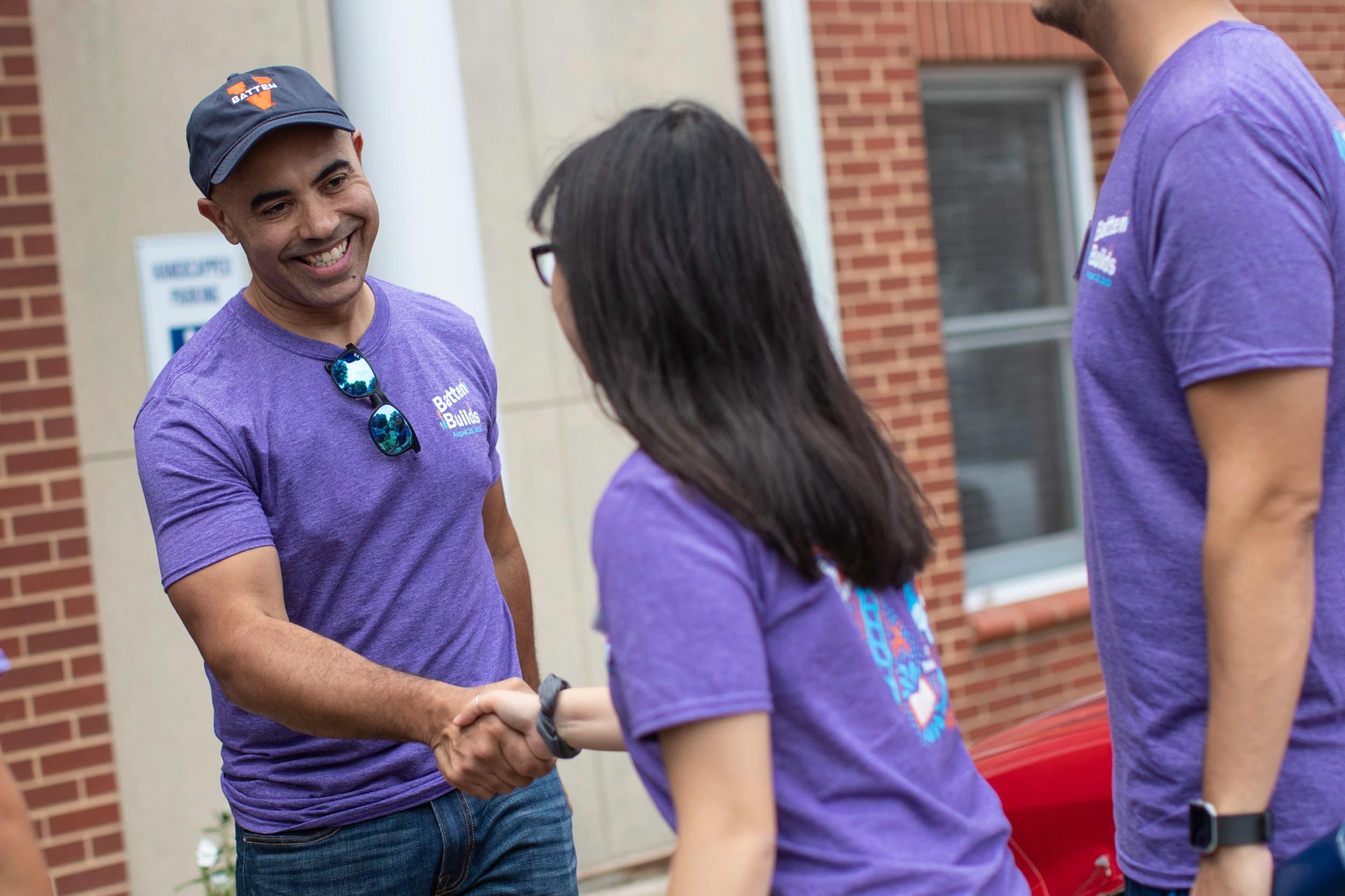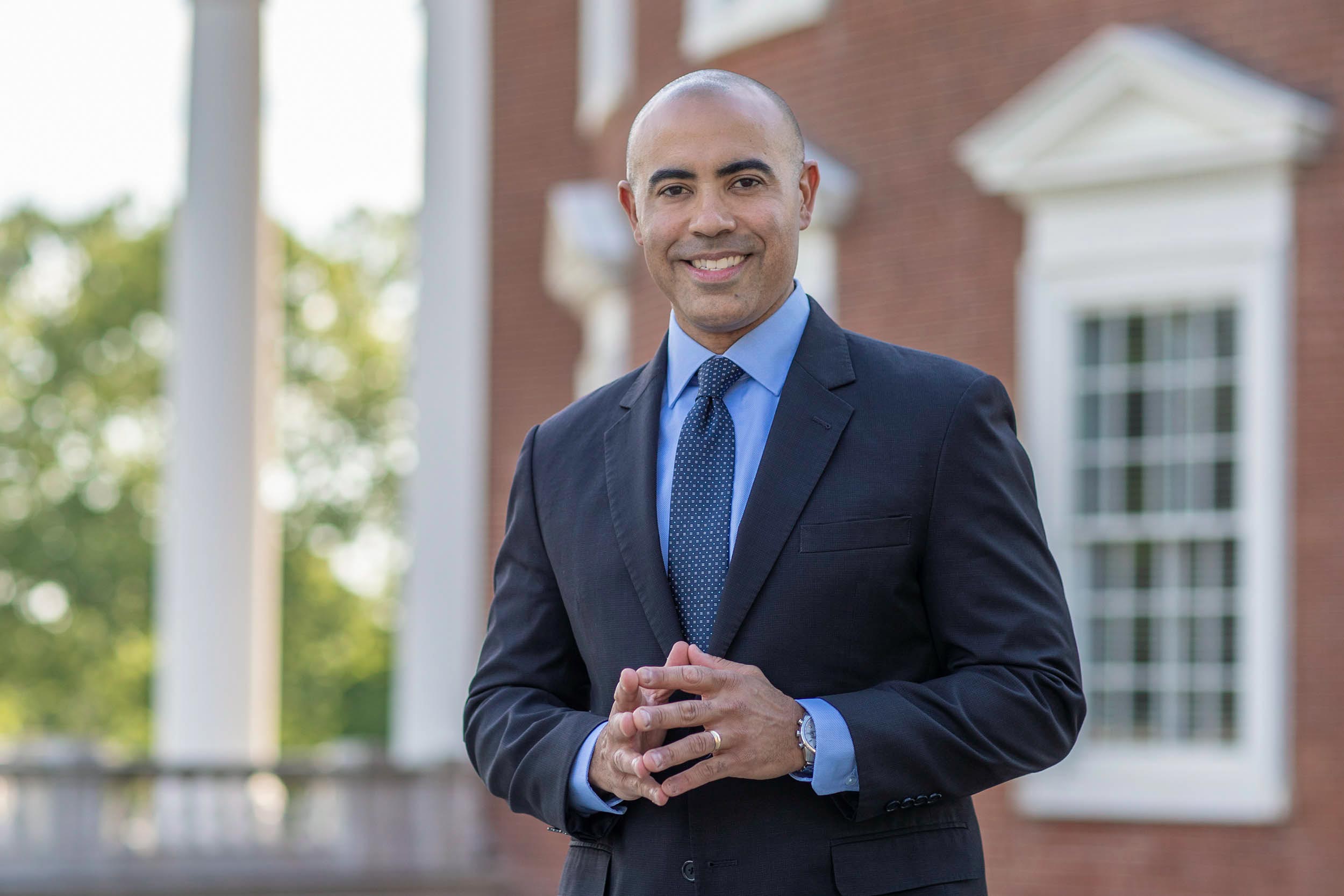Ian H. Solomon officially became the dean of the University of Virginia’s Frank Batten School of Leadership and Public Policy this week. He comes to Batten with more than 20 years of experience as an educator, policymaker, diplomat and businessman in more than 40 countries.
Prior to his appointment at Batten, Solomon served in the Obama administration at the Treasury Department and as the U.S. representative to the World Bank. Before that, he served as then-Sen. Barack Obama’s legislative counsel for four years on Capitol Hill.
He brings experience from McKinsey & Company, from the nonprofit sector, and also from local government. He has held leadership and teaching positions at Yale Law School and the University of Chicago. Most recently, Solomon has been advising governments, multilateral organizations, schools and corporations on issues related to negotiation, collaboration and conflict resolution.
Solomon is a graduate of Harvard College and Yale Law School.
UVA Today met with the dean recently to get his perspective on policy and leadership.
Q. Why did you come to UVA?
A. I was inspired by the mission of the Batten School and the culture of UVA. Coming to Grounds gave me a powerful sense of a culture of humanity and joy among students, faculty and staff.
There is also a compelling curiosity here and a desire to know things and to ask questions and to explore. What the community offers here, in terms of education, potential impact and social experience, is special.
Q. How do you define Batten’s mission?
A. At Batten, we are improving lives through enlightened leadership and effective public policy. We work to cultivate ethical leaders who are attuned to the challenges of this moment and to create the knowledge that empowers effective policy solutions.
As a nation and a globe, we face many challenges now that call for courageous and creative leadership, leadership for diverse and divided communities, leadership that empowers people of all backgrounds to thrive. Batten’s mission aligns perfectly with, and is in service to what the world needs.
Q. What role does negotiation play in leadership?
A. I define negotiation as the process of motivating the cooperation of others in creating solutions to advance our objectives. This applies in our families, at school, at work; we are always negotiating.
Negotiation is a primary tool of leadership because we often have to motivate the cooperation of a variety of stakeholders who have imperfectly aligned interests. How do we motivate that cooperation? Is it on the basis of logic and data and rational argument? Is it on the basis of emotion? Is it by changing certain conditions and experiences? Is it on the basis of authority and coercion? How do we align our interests, understanding that each context is different?
This interactive process to me is negotiation. It’s a core skill that can be integrated into everything we do.
Q. How do you define policy?
A. I think of policy as a set of “working answers” to hard questions.
Take a particular challenge of governance, for example, or inclusion or infrastructure or climate or education. What are the mechanisms, systems, principles, rules, incentives and resources that we can use to help a community collectively achieve a certain outcome? The answers constitute the policy.
And then after we come up with working answers to these hard questions, we have to get support for them, put them into practice, compromise, implement them, learn from them, and improve upon them, with the goal of improving lives. This, of course, takes leadership, and it is why Batten’s mission of creating and applying knowledge around both leadership and public policy together is so valuable.
Q. How do you see Batten’s role in the commonwealth and in the community?
A. We can be a source and an inspiration for both leadership and policy improvement. We can be a place that people come to when they want great talent, and help in solving hard problems in the public interest. We have phenomenal expertise here, whether it’s around health or education or environment or lawmaking or global affairs and humanitarian assistance, or building an entrepreneurial social sector. These are just a few of the areas where we have excellent people, and we are part of an extraordinary University.
If we can help be a bridge between the knowledge and experience created here, and the application of that knowledge to make people’s lives better, that would be an important contribution, both here in the city and also with state policymaking.
I have a lot of ambition for Batten to be thought of as a hotbed of solving problems. We are a place of great students and great teachers wrestling with things that matter.
Q. How do you inspire the students?
A. Batten students typically come here already inspired, so we simply have to tap what I believe is their inherent curiosity. A place like UVA encourages, cultivates, nourishes and rewards that curiosity. Let’s make sure in our classes and in all the learning experiences we create and curate for our students, whether it’s internships or externships or public service projects, that we are pushing them to be curious and to ask questions and to seek answers. Then we can introduce new tools and approaches and perspectives that challenge them and build their skills and resourcefulness.
We’re not going to have all the answers among the relatively small group of students and faculty in this building. Some are going to be found in business, on Capitol Hill or in Richmond, among community groups in Charlottesville, and in other departments of this University. We can help build the ecosystem for our learning, engagement and service.

Dean Ian Solomon introduces himself to students of the Frank Batten School of Leadership and Public Policy before they embark on their Batten Builds projects in the community. (Photo by Sanjay Suchak, University Communications)
Q. What, of your experiences, do you want to pass on to the Batten students?
A. I am less interested in trying to pass along my experiences than in helping our students to have and to reflect upon their own experiences.
I know that I’ve learned the most when I have been pushed beyond my comfort zone, so I want to nudge each student into experiences beyond their comfort zones. I’ve grown a lot when I have had to deal with uncertainty, so I would like students to experience situations where they must deal with uncertainty. I’ve experienced leadership often as a choice that I must make in a particular situation, so I want to put students in circumstances where they have to make a choice to lead and to bring their full toolkit of skills and capacities to bear.
Certainly opportunity and serendipity have been important parts of my journey, and I want to encourage students to seize opportunities and to be open always to serendipity and unexpected possibilities.
Lastly, one of my goals is to remind all of our students that their humanity is an important gift. I care about them nurturing their love for the arts and music and relationships and their passions, because that is what will fire them and power them through hard and difficult times that they may go through.
Q. What are the one or two core things that you want all Batten students to learn while they are here?
A. Batten students learn a tremendous amount in their time here, and my hope is that they will have a lifelong relationship with this institution, not just their few years here in a program.
If there is a core thing, I want them to have a strong capacity for self-awareness, that they will know themselves very well, know their own psychology, how to motivate themselves during those lonely moments, how to pick themselves up after a disappointing event and to have the resources to figure out what they know, what they don’t know, what they need, and who they can call upon for help.
I also want them to learn that they can make every single interaction that they have into an opportunity to make someone else’s world more beautiful, their own world more beautiful, to make their impact on the world more loving and kind. They have the power to choose that.
Q. Over the years, what have you learned about yourself?
A. The only constant in life is change, so the better I am at coping with change, managing change, bouncing back from change and embracing change, the better and more effective I can be.
I have learned that there is so much more that I don’t know than that I do. Humility is essential. Life offers lessons to us about ourselves in every moment.
Q. Now that Batten graduate Malcom Brogdon has moved to the NBA’s Indiana Pacers, has Batten switched its allegiance from the Milwaukee Bucks?
A. I haven’t had the pleasure yet of meeting Malcolm. I understand from those who do know him that he demonstrates great leadership. Good leaders cultivate followers, and I am following Malcolm.
I look forward to following the lives and careers of the extraordinary students who walk through these halls and to see how they evolve and grow and change – changing teams, changing jobs, changing professions, changing political parties, whatever it might be. I hope that they will never lose their core ethical compass and the commitment and curiosity that we seek to cultivate here.
And whether it is the Pacers or the Bucks or any other team, I expect to be proud of the work that they are doing. I think that Malcolm will continue to make a lot of us very proud.
Media Contact
Article Information
August 30, 2019
/content/10-questions-ian-solomon-new-dean-batten-school

